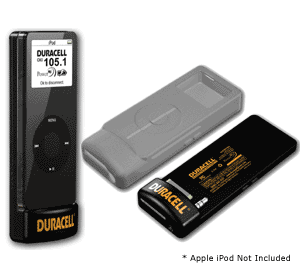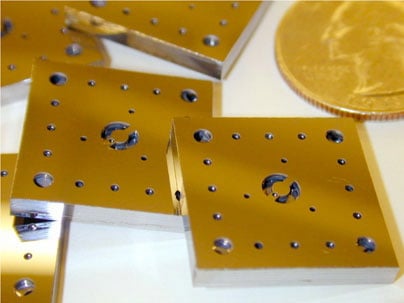Latest Gear Live Videos
CES 2007: Duracell PowerFM iPod Battery & Radio Brick

Posted by Chris Cardinal Categories: Accessories, Apple, CES, CES 2007, Features, Portable Audio / Video,
 The Duracell PowerFM package is a simple lithium-ion battery expander for your iPod nano or video. It will easily double the battery life for your device, but includes a few cool features that set it apart from similar products in the market already. As per its name, it includes an integrated FM transmitter, that allows you to specify which frequency you wish to transmit on. It also includes a pass-through dock and headphone port on the bottom of it, so you can still use other iPod accessories or charge it in a normal charger/docking station (if its able to accommodate the extra depth). Oh, and they throw in a silicone case for the hell of it, to keep your nano shiny and fresh. My only real gripe with the design is that its emblazoned with DURACELL’s copper-top logo, both on the front of the device itself, and on the FM configuration screen itself. It seems to detract a bit from the cool, minimalistic Apple approach, while turning you into a walking battery ad at the same time. Still, integrating FM transmission into a significantly expanded battery life for just $79 is a nice touch. Available now.
The Duracell PowerFM package is a simple lithium-ion battery expander for your iPod nano or video. It will easily double the battery life for your device, but includes a few cool features that set it apart from similar products in the market already. As per its name, it includes an integrated FM transmitter, that allows you to specify which frequency you wish to transmit on. It also includes a pass-through dock and headphone port on the bottom of it, so you can still use other iPod accessories or charge it in a normal charger/docking station (if its able to accommodate the extra depth). Oh, and they throw in a silicone case for the hell of it, to keep your nano shiny and fresh. My only real gripe with the design is that its emblazoned with DURACELL’s copper-top logo, both on the front of the device itself, and on the FM configuration screen itself. It seems to detract a bit from the cool, minimalistic Apple approach, while turning you into a walking battery ad at the same time. Still, integrating FM transmission into a significantly expanded battery life for just $79 is a nice touch. Available now.
Read More  | Duracell Direct
| Duracell Direct
Advertisement
Sony Offers Newest Walkman NW-E005F

Posted by Sheila Franklin Categories: Portable Audio / Video,

The NW-E005F Walkman is Sony’s latest flash-based Mp3 player in their E000 series. At a weight of .8 oz and dimensions of 3.1 x 0.8 x 0.4-inches, it has a storage capacity of up to 2 GB and a battery life of up to 28 hours. The Walkman features a built-in FM tuner, a one-line OLED screen, and a USB thumb drive. It comes with earbuds and is available at a MSRP of $120-151, depending on where your Santa shops for stocking stuffers.
Read More  | Sony NW-E005F Product Page via PC Magazine
| Sony NW-E005F Product Page via PC Magazine
MEMS Turbine Power Source
Posted by Brian Viele Categories: Design, Misc. Tech, PC / Laptop,

Micro Electro-Mechanical Systems (MEMS) are everywhere in today’s world. Air bag sensors, G-Tech vehicle performance systems, inkjet printers and DLP TV’s are just some of the mainstream uses of MEMS technology. The concept is, take something you know works well on a large scale, and shrink it down as much as possible. Well, MIT researchers are trying to use this technique to replace today’s concepts of personal power sources such as batteries, and more recently fuel cells, a MEMS device.
This new device is a miniature turbine engine. As with most MEMS projects, this idea is based on current “real size” technology. One of the methods employed by power plants is using large turbines to generate power for its customers. These MEMS devices will accomplish the same task, but on a much smaller scale. It will be a “Personal Power Plant” if you will. The turbines will spin at speeds of around 1.2 Million RPM (20kHz) and it has been estimated that due to the quality of the device and materials used, they should be able to achieve better efficiency numbers than the current turbines used in power plants. What does all this mean? Well, for now, not much, but for the future, this may be a step in the right direction to creating cheaper safe power for millions across the globe.
Read More  | MIT
| MIT
Bleeding Edge Byte 030: A Look At Batteries

Posted by Andru Edwards Categories: Accessories, Features, Misc. Tech, Science, Videocasts,
Bleeding Edge Byte 030: A Look At Batteries

Posted by Andru Edwards Categories: Short Bytes, Features, Product Reviews, Videocasts,
Being in love with mobile technology and gadgets, the one thing we all have in common is our dependence on batteries. What most don’t know is that there are quite a few varieties of batteries out there, each with it’s own pros and cons. In this episode, we show you a few different batteries, chargers, and hook you up with some knowledge to stay powered while on the go.
Apple Recalls 1.1 Million Batteries Due To Fire Hazard

Posted by Andru Edwards Categories: Apple, Corporate News, PC / Laptop,
Now, we bet a few Apple fanboys are going to be feeling a bit sheepish over this one. A couple of weeks back, Dell issued a sweeping recall of laptop batteries, garnering a few point-and-laughs from the non-PC using side of the fence. Of course, Dell was just acting responsibly here, as it is actually Sony who manufactures the faulty batteries for Dell. The thing is, they also manufacture the batteries for Apple, and thusly, Apple has issued a recall of 1.1 million iBook and PowerBook batteries. If you would rather not have your G4-based Apple portable burst into flames, you may want to click on over to the US Consumer Product Safety Commission page, detailing the recall.
(Thanks Veronica!)
Read More  | US Consumer Product Safety Commission
| US Consumer Product Safety Commission
Advertisement
© Gear Live Inc. {year} – User-posted content, unless source is quoted, is licensed under a Creative Commons Public Domain License. Gear Live graphics, logos, designs, page headers, button icons, videos, articles, blogs, forums, scripts and other service names are the trademarks of Gear Live Inc.










